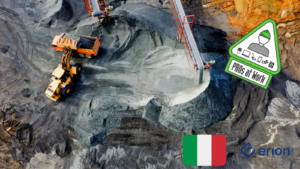 08/07/2022
08/07/2022Erion, the largest Italian system for the management of waste associated with electronic products and the valorisation of the raw materials within it, has recently commissioned a study The evolving scenarios of critical raw materials and the recycling of technology products as a strategic lever to reduce supply risks for Italy” carried out by The European House – Ambrosetti.
Critical raw materials are now essential prerequisites for the development of strategic sectors and are particularly significant for industrial production with strong potential for future growth, starting with technologies for the ecological transition. Critical raw materials are, in fact, used in wind turbines, photovoltaic panels, and batteries.
Due to the concentration of production in third countries, the European Union, in addition to investing significantly in domestic production, can achieve a significant contribution from recycling technological products by enhancing a circular economy paradigm.
In order for the recycling of technological products to become a strategic lever to reduce supply risks for Italy, it is necessary to act on 3 levels: regulations, volumes and plants equipment, with the ultimate goal of developing local supply chains.
Read more in the Executive Summary or discover the full report.
THE 5 KEY MESSAGES OF THE STUDY:
1. Critical raw materials are characterised by high economic importance and high supply risk. In 2020, the European Union launched an action plan to address dependence on third-country supplies.
2. Critical raw materials are relevant to multiple industrial ecosystems: in Italy, about EUR 564 billion enter industrial production (equal to about one-third of the 2021 Italian GDP).
3. The reference scenario of critical raw materials sees a concentration of production where China is today the world’s main supplier for 66 percent of critical raw materials.
4. A contribution to the strengthening of independence from third countries comes from technological products which, if properly recovered and recycled, make it possible to reduce dependence on critical raw materials, enabling economic, social and environmental benefits.
5. In order for the recycling of technological products to become a strategic lever to reduce supply risks for Italy, it is necessary to act on 3 levels: regulations, volumes and plants equipment, with the ultimate goal of developing local supply chains.
About
The WEEE Forum a.i.s.b.l. is an international association representing 51 producer responsibility organisations across the globe. Together with our members, we are at the forefront of turning the extended producer responsibility principle into an effective electronic waste management policy approach through our combined knowledge of the technical, business and operational aspects of collection, logistics, de-pollution, processing, preparing for reuse and reporting of e-waste. Our mission is to be the world’s foremost e-waste competence centre excelling in the implementation of the circularity principle.
Transparency Register ID 702397445-73.
Copyright 2019 All Rights Reserved
Contact
BluePoint conference and
business centre
Boulevard Auguste Reyerslaan 80
B-1030 Brussels
Belgium
Newsletter
Subscribe to our mailing list to get the updates to your email inbox.